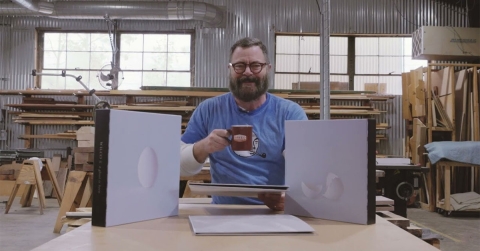The music manuscripts and papers of composer and conductor John Adams have been acquired by the Library of Congress. “The Library of Congress could scarcely conjure a contemporary music collection that carries with it as much recognition and consequence as the manuscripts and papers of John Adams,” said Librarian of Congress Carla Hayden. “We are proud to count the collection of Adams’ materials among our prized music treasures.” “To have my archives under the care and preservation of the Library of Congress is a great privilege,” said Adams. “Over the years I have visited the Music Division, met their brilliant staff and had the special chance to hold in my hands manuscripts by among others, Brahms, Schoenberg, Bernstein, and Charlie Parker. As an American composer—especially with a name like mine—it seems only right that my own work should be with this great institution.”
The Library of Congress has announced its acquisition of the music manuscripts and papers of composer and conductor John Adams. “The Library of Congress could scarcely conjure a contemporary music collection that carries with it as much recognition and consequence as the manuscripts and papers of John Adams,” said Librarian of Congress Carla Hayden. “We are proud to count the collection of Adams’ materials among our prized music treasures.”
“To have my archives under the care and preservation of the Library of Congress is a great privilege,” said Adams. “Over the years I have visited the Music Division, met their brilliant staff and had the special chance to hold in my hands manuscripts by among others, Brahms, Schoenberg, Bernstein, and Charlie Parker. As an American composer—especially with a name like mine—it seems only right that my own work should be with this great institution.”
The archive acquired by the Library of Congress—the world's largest library—includes a variety of materials that tell the story of Adams’ creative life: handwritten music manuscripts and annotated music scores, business and personal correspondence, photographs, date books and diaries, journals, publishing and performing contracts, artwork, childhood essays and music-theory lessons, and files of news clippings and concert programs.
According to the Library of Congress, the evolution of many works can be traced through voluminous music sketches written in pencil, such as the seven notebooks for Adams’ orchestral work Harmonielehre. Boxes of materials for his operas demonstrate the many phases involved in the production of his large-scale stage works, from background research and early notes on plot and characters, to music drafts and sketches, to complete music manuscripts and annotated full scores used at the point of performance. Letters and notes exchanged with frequent collaborators Peter Sellars and Alice Goodman show the inner workings of Adams’ complex theatrical compositions.
The papers of Adams will join those of other American giants in the performing arts, including Leonard Bernstein, Aaron Copland, George and Ira Gershwin, Martha Graham, Charles Mingus, and Neil Simon, maintained in the Library’s Music Division.
In 2022, Nonesuch Records released John Adams Collected Works, a forty-disc box set featuring recordings spanning more than four decades of the composer’s career with the label, plus two extensive booklets with new essays and notes by Timo Andres, Julia Bullock, Robert Hurwitz, Nico Muhly, and Jake Wilder-Smith. Nonesuch made its first record with John Adams in 1985; he was signed exclusively to the label that year, and since then the company has released forty-two first recordings and thirty-one all-Adams albums. Collected Works includes thirty-five discs of Nonesuch recordings and five from other labels.
- Log in to post comments



